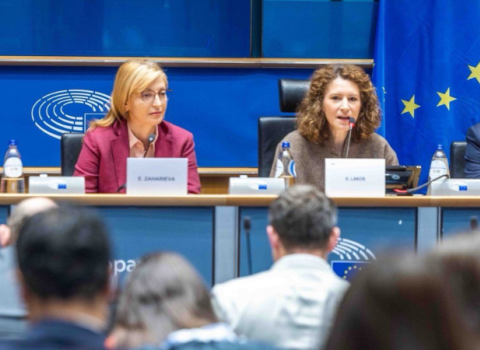
MEP Jorgo Chatzimarkakis
At present, different application forms are required for each type of research funding and the same project cannot normally apply for both Cohesion Funds and Framework Programme money, “We have to change this in the new five-year term,” Chatzimarkakis told Science|Business in an interview. “What we need is a streamlining of these activities, streamlining everything towards the same strategic goal.”
The new Europe 2020 strategy underlines the need for R&D and innovation to be cornerstones of the EU economy. Given this, it is crucial the EU’s various R&D funding programmes are better coordinated, argues Chatzimarkakis, who is ITRE’s draftsman for a parliamentary resolution calling for this simplification. (The lead on this resolution is the Regional Development Committee).
ITRE wants to see a, “more harmonised approach, better coordination and more exchange of information between the different programmes” that provide research funding. “Diverse rules, procedures and practices unnecessarily hinder effective implementation,” the committee says.
Chatzimarkakis points to Greece to highlight the stifling effects of this bureaucratic complexity. “The Greeks would have had much better results, to take one example, if they could have used both Cohesion fund money and Framework Programme 7 money to set up innovation facilities, for instance in Information and Communication Technology. But they couldn’t do so,” he says.
Chatzimarkakis wants a simplification of the rules too, pointing to the European Institute of Innovation and Technology and the Joint Technology Initiatives as cases where the EU is as demanding as ever in applying its rules, even though these are public-private partnerships.
“The EU steps in with less and less money, but demands more and more application of rules. This is not the way to deal with it,” the MEP says. “The stricter we are as a European Union, the less we fuel the freedom of science.”
Chatzimarkakis acknowledges there will always be a need for some rules: it is, after all, taxpayers’ money the EU is handing out. He suggests that alongside a simplification of the rules, more information is made available, so people know what funding opportunities exist and how to apply.
Another suggestion to make it simpler to access grants is the appointment of “science mangers” or “innovation managers” in universities, communities and regional development bodies, who are trained by the European Commission in how EU funding rules work.
“We need more people who are acquainted with the rules. You need people acquainted with how to get the money, or how to combine the money,” Chatzimarkakis says. Such a system is in place in the Saarland, the region he represents, and in his opinion this helps explain why the state has the highest level of EU research funding per capita in Germany.
From a wider perspective, Chatzimarkakis considers the proposed Europe 2020 strategy - the roadmap for the EU’s economic strategy in the coming decade - to be an improvement on its predecessor, the Lisbon strategy. It has fewer targets and is more measurable, he says approvingly.
He acknowledges that some of elements of Europe 2020 involve little more than giving new names to old ideas, such as “European Innovation Partnerships” between the EU and member states, while others are a straightforward repeat of old pledges, such as restating the target of investing 3 per cent of the EU's gross domestic product in research and development. But it is a “new commitment,” he says.
One area where the MEP is less convinced is the European Commission’s interpretation of the term “innovation”. Representing the Saarland, a state whose economy is highly dependent on the steel and automotive industries, Chatzimarkakis strongly believes more emphasis needs to be put on industry.
Rather than trying to remove industry from the EU strategy, it should include an industrial dimension, he says. For example, reducing CO2 emissions should be achieved by coming up with innovative ways for industry to be more energy efficient, not by trying to get rid of industry.
“We are fed up listening to people who try to tell the world that only services are innovation and industry is not innovation,” Chatzimarkakis said.





 A unique international forum for public research organisations and companies to connect their external engagement with strategic interests around their R&D system.
A unique international forum for public research organisations and companies to connect their external engagement with strategic interests around their R&D system.